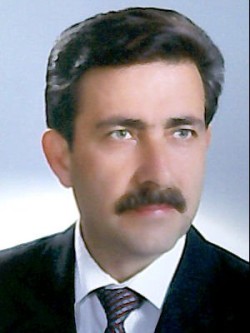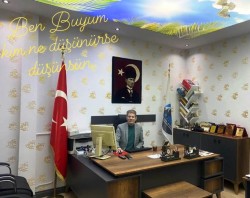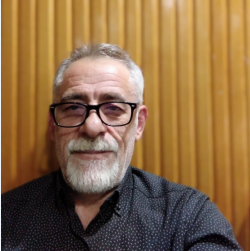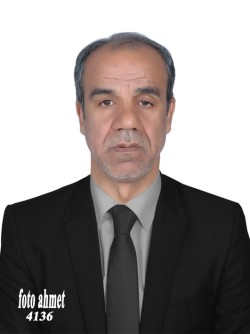
Haddini bil, mutlu ol!
Allah kendi mülkünden halife olarak atadığı insana kullanabilmesi için sınırlı bir alan tahsis etmiştir.
İnsana tahsis edilen alan görülmeyen ama son derece net hissedilen lazer ışıklarıyla belirlenmiştir.
Bu lazer ışıkları yaklaşıldığında dahi insanı açıkça uyarmaktadır.
İnsanın sınırlarını belirleyen lazer ışıklarına yaklaşıldığında ya da temas edildiğinde ortaya çıkan reaksiyona “stress” diyoruz.
Eğer hayatınızda stress varsa Allah’ın size çizdiği sınırları zorluyorsunuz demektir.
Biz ilah değiliz, O’nun kullarıyız.
Âdem (a.s.) gibi Allah’ın yaklaşmayın dediği sınırlara yaklaşmadığımız sürece cennetteyiz.
Sınırları zorladığımız zaman da cehennemin numuneleri ve stress bizi bekliyor.
İnsanın haddini aşmasının faturasına dair tarihte bireysel veya kitlesel/toplumsal çokça misaller vardır.
Karun haddini aştığı için servetiyle birlikte yerin dibine gömülmüştür.
Firavun ve kavmi haddini aştığı için denizin dibinde boğulmuştur.
Hz. Yunus (a.s.) haddini aştığı için balığın karnına düşmüş, samimi bir tövbe ile kurtulmuştur.
Pisagor'un Adalet Kupası (ayrıca Pisagor Kupası), dışarıdan bakıldığında içeceklerin konulduğu sıradan kupalara benzeyen; fakat içinde özel bir düzenek bulunan Samos'lu Pisagor'a atfedilen bir tür pratik eğlence bardağıdır. Bardağın içindeki düzenek, bir kolon ve bu kolonda bulunan bir kanaldır. Su, bu kolonun seviyesinin altına kadar doldurulduğunda diğer normal kupalarda olduğu gibi durmaktadır. Fakat su bu kolonun seviyesini geçerse ortadaki kolon ve içindeki kanal da su ile dolar ve ardından sifon (siphon) etkisi devreye girer. Böylece kupanın içinde bulunan suyun tamamı dökülmüş olur.
Pisagorun adalet kupası insanın haddini bilmesi gerektiğini anlatır akıllı olan insana…
İnsanın haddini aşmasının sonuçları ilkokulda “altın yumurtlayan tavuğu kesmek” hikayesi üzerinden anlatıldı bizlere…
“Pygmalion etkisi” de insanın hadsizliğinin sonuçlarına işaret eder.
Efsaneye göre Kral Pygmalion bir heykel yapar.
Sonra elleriyle yaptığı fildişinden bu heykele âşık olur.
Bunun üzerine Aphrodite, Pygmalion'un heykelini canlandırır!
Ve stres…
İtalyan ressam - heykeltıraş Michelangelo, Musa heykelini yapıp karşısına geçer...
Bir süre sonra çekicini alır ve bağırarak heykele fırlatır:
-Perché non parli.
Yani:
-Ey Mûsa! Konuşsana, neden konuşmuyorsun?
İşte burası insanın lazer ışıklarıyla oynamaya başladığı yerdir.
Hz. Nuh (a.s.) oğlu Kenan için ehlimden ısrarı üzerine lazer ışıklarına temas etmiş ve “O senin ehlin değil” (Hud, 11/46) ikazıyla karşılaşmıştır.
Hz. Peygamber (s.a.v.) amcası Ebu Talip için çok ısrar ederek lazer ışıklarıyla tanışmış ve “Sen sevdiğini hidayete erdiremezsin; bilakis Allah dileyene hidayet verir ve hidayete girecek olanları en iyi O bilir.” (Kasas, 28/56) uyarısının muhatabı olmuştur.
“Kendini bil!” “Haddini bil!” demektir.
Allah’ın bize çizdiği sınırları bilmek için önce O’nu sonra kendimizi iyi tanımamız gerekiyor.
“Kendini bilen Rabbini bilir” sözü bu gerçeğe işaret eder.
Ne mutlu o kimseye ki, haddini bilir tavrında tecavüz etmez.
Dünyada mutlu bir hayat yaşadığı gibi ebedi saadete de kavuşur.
Onlar Allah’ı dost edinmiş, Allah’ın da onları dost edindiği “haddini bilen, saygıda kusur etmeyen, kendi kulvarını aşmayan” mütevazı insanlardır.
“Bilesiniz ki, Allah’ın dostlarına hiçbir korku yoktur. Onlar üzülmeyeceklerdir de.”(Yunus, 10/62)
Know your place, be happy!
Allah has allocated a limited area from His own property to the person He appointed as Caliph to use.
The area allocated to humans is determined by laser lights that cannot be seen but can be felt very clearly.
These laser lights clearly warn people even when approached.
We call the reaction that occurs when approaching or coming into contact with laser lights that determine human limits, "stress".
If there is stress in your life, it means you are pushing the limits that God has drawn for you.
We are not gods, we are His servants.
We are in heaven as long as we do not approach the limits that Allah said not to approach, like Adam (a.s.).
When we push the limits, examples of hell and stress await us.
There are many individual or mass/social examples in history about the consequences of exceeding one's limits.
Because Karun exceeded his limits, he was buried underground along with his wealth.
Pharaoh and his people drowned at the bottom of the sea because they exceeded their limits.
Hz. Yunus (a.s.) fell into the belly of the fish because he exceeded his limits, but he was saved by sincere repentance.
Pythagoras' Cup of Justice (also Pythagorean Cup), externally similar to ordinary cups in which drinks are placed; but it is a type of practical entertainment cup attributed to Pythagoras of Samos, which has a special mechanism inside. The mechanism inside the glass is a column and a channel in this column. When the water is filled below the level of this column, it remains just like any other normal mug. However, if the water exceeds the level of this column, the column in the middle and the channel inside are filled with water and then the siphon effect comes into play. Thus, all the water in the cup is spilled.
Pythagoras' cup of justice tells the intelligent person that a person should know his place...
The consequences of exceeding one's limits were explained to us in primary school through the story of "killing the goose that lays the golden eggs"...
The “Pygmalion effect” also points to the consequences of human indifference.
According to legend, King Pygmalion creates a statue.
Then he falls in love with this ivory statue he made with his own hands.
Thereupon, Aphrodite brings Pygmalion's statue to life!
And stress…
Italian painter-sculptor Michelangelo creates a statue of Moses and stands in front of it...
After a while, he takes his hammer and throws it at the statue, shouting:
-Perché non parli.
Well:
-O Moses! Talk, why don't you talk?
This is where one starts playing with laser lights.
Hz. Noah (a.s.) touched the laser lights for his son Kenan upon his insistence from my people and was warned, "He is not your people" (Hud, 11/46).
Hz. The Prophet (pbuh) insisted on his uncle Abu Talib and introduced him to laser lights and said, “You cannot guide the one you love; On the contrary, Allah guides whoever He wishes, and He knows best those who will be guided.” (Kasas, 28/56) was the addressee of the warning.
"Know yourself!" “Know your place!” means.
In order to know the boundaries that God has drawn for us, we need to know Him well and then ourselves.
The saying "He who knows himself knows his Lord" points to this truth.
How happy is the person who knows his place and does not rape.
Just as he lives a happy life on earth, he also attains eternal happiness.
They are humble people who have taken God as their friend and God has made them their friends, "who know their place, who do not fail to show respect, and who do not exceed their own limits."
“You should know that there is no fear for the friends of Allah. And they will not be sad.” (Yunus, 10/62)
 Erol Sunat
Biz Bizden Gidemeyiz
Erol Sunat
Biz Bizden Gidemeyiz
 Dr. Cemil Paslı
Özeleştiri mi/Savunma mı?
Dr. Cemil Paslı
Özeleştiri mi/Savunma mı?
 Mehmet Karataş
Lale Devrini Yaşıyoruz.
Mehmet Karataş
Lale Devrini Yaşıyoruz.
 İmdat Yayla
Teşkilatın İl ve İlçe Başkanlığına Liyakatli insanlar Getirilmeli
İmdat Yayla
Teşkilatın İl ve İlçe Başkanlığına Liyakatli insanlar Getirilmeli
 ŞÜKRÜ PORTAKAL
Neden Kazanamadılar
ŞÜKRÜ PORTAKAL
Neden Kazanamadılar
 Muhammed Kemal Erdem
Harunlar Köyü Adını Seyyid Harun Veli’den mi Alıyor?
Muhammed Kemal Erdem
Harunlar Köyü Adını Seyyid Harun Veli’den mi Alıyor?
 Mahmut İşcan (İlçe Milli Eğitim Müdürü)
Güzel Bak Güzel Gör
Mahmut İşcan (İlçe Milli Eğitim Müdürü)
Güzel Bak Güzel Gör
 Ayşe ÜNÜVAR :(Uzm. Psk. Dan. Eğitimci Yazar)
Eskidendi Şivlilik
Ayşe ÜNÜVAR :(Uzm. Psk. Dan. Eğitimci Yazar)
Eskidendi Şivlilik
 Duran Çölcü
Savunma Sanayinde Konya’nın Gücü Giderek Artıyor
Duran Çölcü
Savunma Sanayinde Konya’nın Gücü Giderek Artıyor
 PROF. DR. ŞAHİN AKINCI
Bir Yargı Krizi: Yargıtay’ın Şerafettin Can Atalay Kararı
PROF. DR. ŞAHİN AKINCI
Bir Yargı Krizi: Yargıtay’ın Şerafettin Can Atalay Kararı
